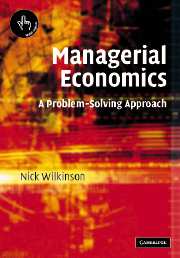Chapter 1 - Nature, scope and methods of managerial economics
Published online by Cambridge University Press: 05 June 2012
Summary
Objectives
To introduce and define managerial economics.
To outline the types of issue which are addressed by managerial economics.
To explain the difference between positive and normative economics.
To explain the relationship between managerial economics, economic theory and the decision sciences.
To explain how managerial economics is related to other disciplines in business, such as marketing and finance.
To identify the main subject areas in managerial economics, explain how they are related to each other, and describe how they are organized and presented in the text.
To explain the methods used in the development of scientific theories and show their relevance to managerial economics.
To explain how economic theory is presented from a pedagogical viewpoint, and how this relates to the organization and presentation of the material in the text.
Introduction
What is managerial economics about? What kind of issues does it deal with? How can it help us make better decisions, in business or elsewhere? These are fundamental questions which any student may ask when first approaching the subject. It is therefore a good idea to make a start by examining a situation that has become increasingly high on the economic and political agenda on a global basis over many years; yet it is not a situation where it might seem at first sight that managerial economics is particularly relevant. We shall see, to the contrary, that the methods studied and implemented in managerial economics are vital to identifying solutions to the problems raised.
- Type
- Chapter
- Information
- Managerial EconomicsA Problem-Solving Approach, pp. 3 - 19Publisher: Cambridge University PressPrint publication year: 2005
- 1
- Cited by



